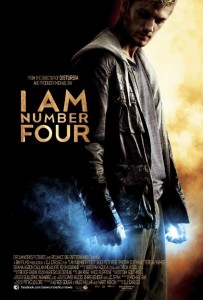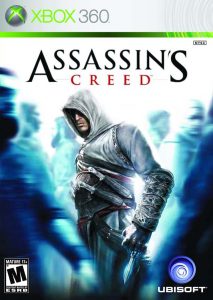 Let me say off the bat, the CGI was a little bit terrible. I’m not sure how good expensive CGI can get, either because I haven’t seen it or don’t remember, but cheap CGI[1] just can’t do mammals at all. It can do reptiles okay, but fur is just a complete show-stopper. The reason for that disclaimer, as you may otherwise have been asking, is that I Am Number Four was mostly enjoyable, contrary to what expectations I had been given. And that’s always pretty cool, right?
Let me say off the bat, the CGI was a little bit terrible. I’m not sure how good expensive CGI can get, either because I haven’t seen it or don’t remember, but cheap CGI[1] just can’t do mammals at all. It can do reptiles okay, but fur is just a complete show-stopper. The reason for that disclaimer, as you may otherwise have been asking, is that I Am Number Four was mostly enjoyable, contrary to what expectations I had been given. And that’s always pretty cool, right?
Plus, it had what I believe is a unique premise in the annals of Hollywood history. Well, no, that’s not true at all, but I think this particular combination of two premises is unique[4]: prince on the run from alien assassins combined with high school angst. It sounds a lot more like a TV show, right? But I think it would have been too angsty to work on TV; the forced speed of the movie format made up for a lot of what might otherwise have been annoying digressions, and it only barely gave me a chance to think about the worst, most teenaged part of the plot. And corollary to those improvements via limited screentime, I hope it doesn’t do well enough for people to pick up the pie-sized bread crumbs of sequel bait and start running with them.[5]
I won’t say much more about the plot beyond acknowledging the premise, both halves of which are visible within ten minutes of screen time anyway, but I should say a bit about the acting. Dianna Agron from Glee (who has a broader résumé than I’d have guessed) did a nice job as the outcast shutterbug love interest, and I suspect that someday soon she might be able to get herself a role that isn’t defined by another member of a cast. And Timothy Olyphant[6], easily the best of the bunch as the aforementioned prince’s guardian, manages to maintain the amusedly-detached-with-flashes-of-intensity hyper-competence I’m used to from his characters without ever giving the impression that he’s above either the cast or the angsty half of the plot, despite that he so clearly is.
Anyway, I dug it. Except for the mammalian CGI. Just saying, that was a bad idea, way worse than the angst or a sequel would be. (Probably not worse than a TV show, though.)
[1] My premise may be wrong, and all CGI has this problem? But I’m guessing not. (Or hoping not.)
[2][3] It must be a problem with all CGI, though, since obviously Michael Bay can afford the good shit.
[3] I know what you’re thinking, and you’re wrong. Consider it an easter egg hunt.
[4] Not the practice of mashing-up, clearly.
[5] I also hope I stop with the metaphors, because, wow. I am so, so sorry.
[6] If you are not familiar with his work in Deadwood and Justified, you’re doing it wrong.
 To be clear, this is a pretty old game. I remember reading about
To be clear, this is a pretty old game. I remember reading about